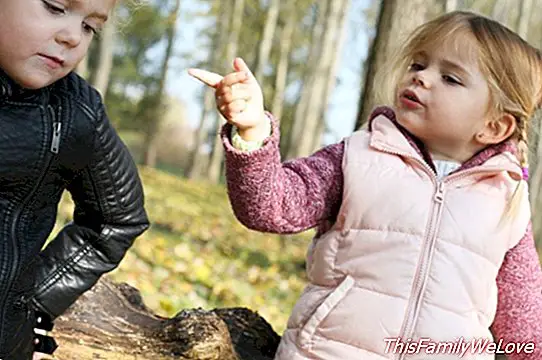Child aggression: 6 tips to prevent behavior problems

Children who exhibit aggressive behavior do not do so because they are bad or because they have an aggressive nature. Little by little, depending on how these behaviors are answered, neurological patterns of responses are created to what the child may consider a threat. This process usually happens in a gradual and unconscious way and this is how the child aggressiveness.
The limbic system is responsible for the emotional processes in the brain. With time and maturity children learn to control their emotions. Once the pattern of aggressive response, The limbic system goes to aggressiveness as a preferred response, but this can be avoided. The way we respond to aggressive behaviors will dictate his habitual presence. This process must be done consistently and, like any change in behavior, it will take time.
6 tips to prevent child aggression
When a child has no tolerance for frustration and reacts aggressively, he or she has a greater risk of long-term behavioral problems. The best way to prevent child aggression is to intervene as soon as possible.
To prevent child aggression, follow these tips to prevent aggressive behavior from becoming a pattern, as well as to try to solve them once established.
1. Avoid punishing aggressive behavior with aggression
Parents and adults are role models in every child. If we respond with aggressiveness it is very possible that our children also react in a similar way. Being aggressive in our responses does not always entail being physically aggressive, too you can be aggressive with the language or with the tone.
Parents who are verbally or physically aggressive promote aggression in their children. A child can show aggressive behaviors despite not having specifically observed that behavior at home (for example, hit their peers even if nobody in their house has ever hit anyone), but this could be an answer acquired when watching TV shows, video games aggressive or violent movies. In this way we not only have to be models in the example but also with the environment to which we expose our children.
2. Nonaggressive behaviors must be reinforced
When we notice that our child behaves appropriately and not aggressively, we must let him know and congratulate him for it. You have to tell him how proud we are of him and that he should be proud of himself. This not only reinforce positive behavior, but it will also help develop an inner sense of pride.
3. Clarity before the expected behaviors and those to avoid
We must inform our children clearly about what behaviors will not be tolerated and which are appropriate. We can work with our son to develop goals to improve his behavior. The use of a behavior chart where we put a sticker for each positive behavior, for example, could be a visual way to keep track of improvements.
4. Avoid reinforcing aggressive behavior
It is common for teachers and parents to unconsciously reinforce aggressive behavior through the attention we give them. Some children feel that getting negative attention is better than not having any kind of attention, that is, sometimes they just want to get attention. In this way you should try to reinforce those positive behaviors and ignore as much as possible the aggressive ones.
5. Consider alternatives to aggressive behavior
Making use of techniques such as the role play, we can practice and teach our children to find alternative behaviors to aggression. We can play at times of frustration and practice different solutions. We can talk to them and ask them how they would react to different conflicts. This practice will help reprogram the behaviors associated with frustration in the limbic system.
6. Eliminate the causes of stress and anxiety
Maybe at home there is some problem or tension that is affecting the child. It would be beneficial to protect him from possible discussions and leave him out of tension.
Maite Balda Aspiazu. Psychologist and Master in Cognitive Neurosciences
It may interest you:
- From the child indulged in the aggressive teenager
- Hit, bite, insult ... are there good or bad children?
- Why some children are aggressive
- Causes of childhood aggression
- Just want to get attention: survival guide for parents




